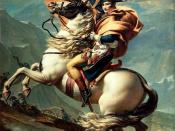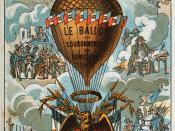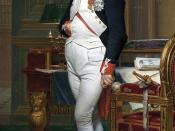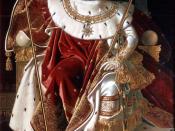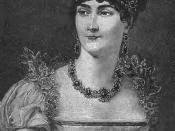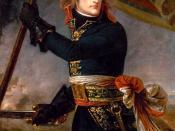Napoleon Bonaparte Napoleon Bonaparte, who was also known as the "Little Corsican"ÃÂ (and later known as Emperor of France, and the prime mover of the Napolionic Wars), was born on August 15, in 1769 in Ajaccio, Corsica. From 1784 to 1785, Napoleon attended the Ecole Militire in Paris, where he received his military training. After the French Monarchy was overthrown on August 10, 1792, Napoleon decided to make his move up in the ranks. In 1793, Napoleon was chosen to direct the artillery against the siege in Toulon. He seized ground where he could get his guns in range of British ships. Soon after that, Toulon fell and he was promoted to the rank of brigadier general. In 1794, he was wed to Josephine de Beauharnais. In 1795 Napoleon was appointed to put down a revolt in Paris. All he did was have his men shoot all the rebels in the streets.
The French government was saved, but they decided to form a new government called the Directory. Napoleon was made commander of the French army in Italy, and he could not be stopped. Soon, instead of taking the defensive position Napoleon started taking the offensive position and thus, he started his conquest of Europe. During one attack he showed his bravery by forcing his way across a burning bridge. After that his troops gave him the name "Petit Caporal"ÃÂ or in English "Little Corporal"ÃÂ and the name stuck with him. In 1797 Napoleon negotiated a treaty with Austria called Campo Formio. Austria gave up its Netherlands and Lombardy to France. Austria also recognized Rhine as the eastern boundary of France. In return France gave Austria most of the old Venetian Republic. Napoleon returned in 1799 to find that the Directory was a mess. He, in his selfish way, saw this as the perfect time for self-advancement. So in November of 1799 he overthrew the Directory. He set up a government called the consulate in which he was the first of three consuls. About three years later, he made himself first consul for life. Everyone in France loved him then. Soon after the change in government, Napoleon began calling himself Napoleon I, instead of General Bonaparte. At this time, Napoleon had complete military and political power. In 1802, Germany and England were tired of fighting, so they signed a peace treaty. During the 14 months that followed, Napoleon drastically changed Europe. He reshaped Switzerland with France. He annexed Piedmont, Parma, and the Island of Elba to France. He also made the Napolionic code, which was the first clear, compact statement of the French law. The Napolionic Code has served as a base for legal systems all over the world. In 1803, war broke out between England and France. He crushed the Prussians at Pena. And he defeated more Russians at Friedland. He then created a peace treaty called the Peace of Tilsit. This basically brought all of Europe to his feet. In 1809 he ended his marriage with Josephine, but remarried again in 1810. At that time, he got a son, which made him very secure. Secure enough to wipe out most of the German states, which totally dissolved what was left of the Holy Roman Empire. Russia did not like Napoleon's continental system. The continental system basically cut off trade with Britain. Everyone had found ways to work around it, but Russia finally decided to abandon it. In 1812, Napoleon made a strategic error. Initially defeating the Russians at Borodino, he found the advance into Russia restrained by the "burnt-earth"ÃÂ strategy practiced by the Russians. As it became cold and wintry, Napoleon retreated from Moscow. In 1814, Napoleon attempted suicide, but failed. He was then exiled to the Island of Elba. In 1815, he escaped from Elba. He collected devotees along the way back to Paris, making a triumphant entry in March 1815, and forcing Louis XVIII to flee to the Netherlands. Over the next 100 days, he raised a new Grand Army, with the aim of striking at the allied armies, currently dispersed. Wellington at Waterloo then defeated him. He then abdicated in favor of his son. He was then exiled to The Atlantic Island of St. Helena. He never saw his family again. Napoleon Bonaparte died on May 5, 1821 from stomach cancer.
Word Count: 715
